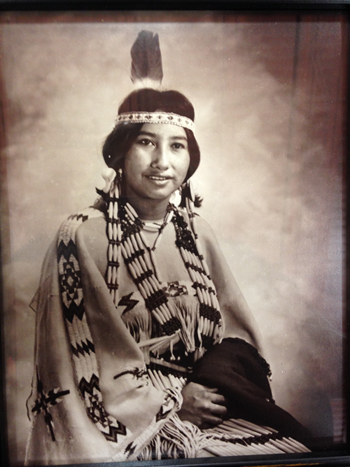Suzanne Blue Star Boy Remembers Women's Leader Tillie Black Bear
Late last week the anti-violence movement was saddened to learn that the
founder of the National Indigenous Women’s Resource Center, Tillie Black Bear, had passed on. V-Day had the honor of working with Black Bear in 2003 when she served as an advisor to the Indian Country Project alongside other Native American elders on the Kitchen Cabinet board.
The Indian Country Project’s leader and Native Women’s Activist, Suzanne Blue Star Boy, has shared the following statement of remembrance:

I had been aware of Tillie’s work since I was a young woman living in South Dakota on the Yankton Sioux Reservation. Tillie lived about three hours away on the Rosebud Reservation. She became the face and founder of the Native anti-domestic violence movement in 1978 when she testified to congress about the prevalence of domestic violence in Indian Country at the U.S. Commission on Civil Rights thus establishing herself as the Grandmother of the Battered Women’s Movement. As she spoke, I thought to myself “who is this incredible Lakota woman?” Little did I know that she would one day be my guide, my mentor, my auntie.
As a brave leader, she worked with the men in law enforcement on the reservation. She would talk to them, and ask, “Do you protect your wife? Yes, he would say. Do you protect your children? Yes, he would say. Will you protect us? Yes, he would say.” And in this way, behind the scene, she was building support and cooperation. Soon we began to see the policemen wearing pins, on their uniforms, supporting the anti-violence movement. Tillie’s strength was in changing the minds of men as well as domestic violence policy in Indian Country in order to change the lives of women.
Before Tillie, no one was focusing on Native women in a national way. She took in the national movement that was happening to raise awareness around domestic violence and refocused it on Indian Country. Her commitment to ending violence against women and girls on local, state and national levels garnered the recognition of President Bill Clinton in 2000, when he awarded Tillie the Eleanor Roosevelt Human Rights Award.
When I think of Tillie, I think about her compassion for women and her fierceness in empowering them. She was so unassuming, she was mindful, she had a quiet resolve, she was a listener. Tillie was able to live every day in the fight for women, she was able to face any adversity because she lived her spirituality. She never separated the spiritual life from her work. She lived compassion, she lived generosity. She was both confrontational and non-confrontational, and was able to work with the men in Indian country because she was leading a movement to protect women, while including men in the conversation.
I want to acknowledge Tillie as a leader for all Native women, as my mentor while I worked on drafting the reauthorization of the Violence Against Women Act (VAWA), but most importantly as a member of my family. Tillie was with me when the last of my father’s sisters passed away. As I mourned the last of my family she said, “Don’t cry Suzanne, I will Hunka you (adopt you) as my niece. I will be your auntie now.” We burned sage and sang. In that moment, we became family.
As the Grandmother, she journeys on but she leaves for us an incredible legacy to uphold: to remain committed, focused and fearless in ending violence against women and girls.
There is no greater inheritance she could leave.






